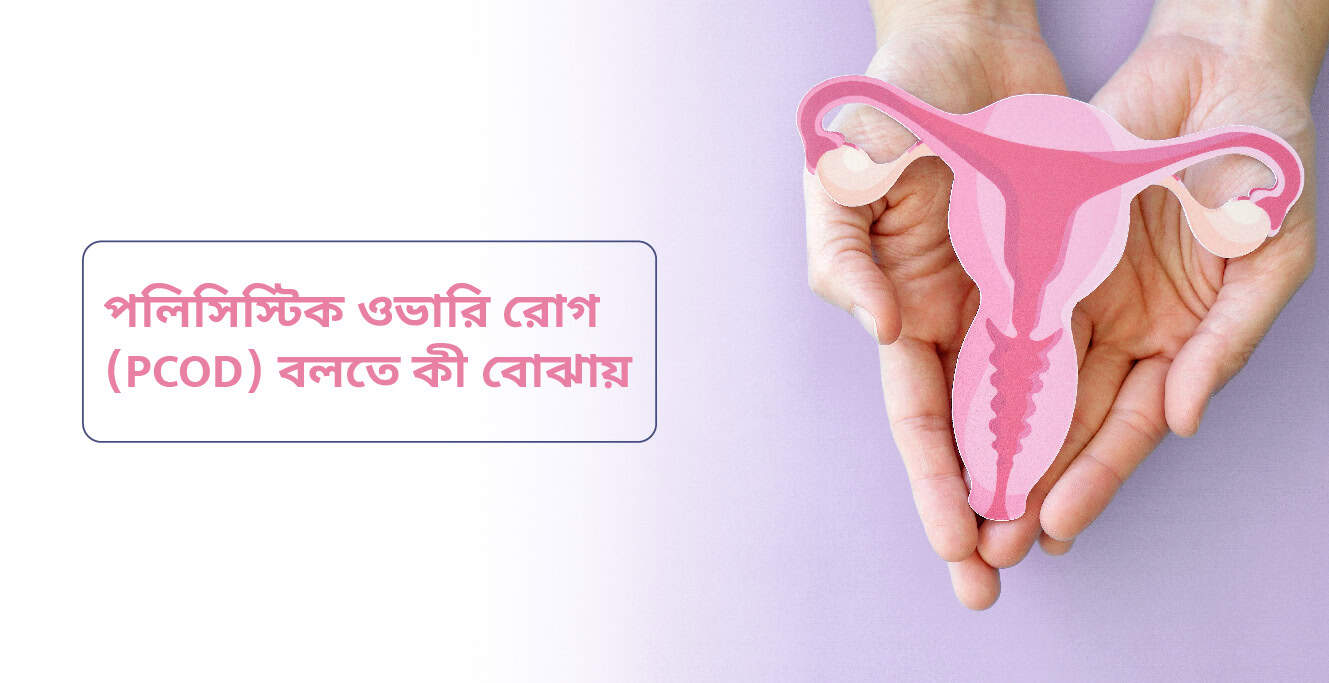
Diet Chart for PCOD : Foods to Eat & Avoid for Better Health

Table of Contents
- Why Does PCOD Cause Weight Gain?
- Can PCOD Weight Loss Diet Plan Really Work?
- Best Foods to Include in a PCOD Diet for Weight Loss
- Foods to Avoid in PCOD Weight Loss
- Lifestyle Changes That Help in PCOD Weight Loss
- 7-Day Diet Chart for PCOD Weight Loss
- Exercise and Hydration in PCOD Weight Loss
- Conclusion
- FAQ’s
PCOD, also known as Polycystic Ovarian Disease, is a condition that is becoming common these days for women in their reproductive years. It can feel overwhelming because it directly affects a woman’s ovaries and, in turn, her overall well-being. The most common symptoms are irregular periods, abnormal hair growth, acne, and more. Apart from these, another frustrating symptom women face is weight gain. It is not just about the appearance; gradual insulin resistance in PCOD increases the tendency to gain weight, leading to visceral fat build-up. This, in turn, can trigger cortisol-related complications and increase the risk of high cholesterol, diabetes, and infertility.
But worry not, you are not alone in this journey. With the help of the right PCOD weight loss diet chart, you can make a huge difference. Even though it is not a one-size-fits-all solution, some small mindful choices like eating nourishing foods, avoiding triggers, and following a balanced meal plan can go a long way in managing PCOD. A healthy and balanced diet improves metabolism and restores hormonal balance. Overall, it brings back a sense of control and confidence in your everyday life.
We’ll go over the right food items to consume, what to avoid, lifestyle modifications, and a useful seven-day PCOD weight reduction diet plan in this article. Let’s understand some basic things first to value the importance of the diet plan more.
Why Does PCOD Cause Weight Gain?
Weight gain in PCOD is associated with insulin resistance and hormonal imbalances, not just eating more or exercising less. Let’s understand these causes briefly:
- Insulin resistance- The body finds it difficult to use insulin efficiently in PCOD, which raises blood sugar levels. This encourages the storage of fat, particularly around the abdomen.
- Hormonal fluctuations- Weight gain, acne, and irregular periods are caused by elevated amounts of androgen, a male hormone.
- Slow metabolism– Women with PCOD frequently have slower metabolisms, which makes it more difficult for them to lose weight.
A PCOD control diet is crucial in this situation. Women can control their hormones, lower their insulin resistance, and gradually lose weight by concentrating on eating the proper meals.
Can PCOD Weight Loss Diet Plan Really Work?
Yes, following a weight loss diet for PCOD is one of the most effective and natural ways to manage its symptoms. It is not about strict restrictions, but about making mindful food choices. A balanced diet ensures:
- Better sensitivity towards insulin
- Reduced inflammation
- Balanced hormones
- Good ovulation leading to healthy fertility
Note: Diet alone won’t work, especially for people who have a slow metabolism. You must add exercise to your daily routine; it can be yoga, cardio, or anything that suits your body’s needs.
Best Foods to Include in a PCOD Diet for Weight Loss
When creating a weight-loss PCOD diet food chart, one must focus on foods that are high in fibre, lean protein, and anti-inflammatory nutrients.
The table below shows some of our top picks that you must add to your diet.
| Type | Items |
| Whole Grains | Brown rice, quinoa, oats, and millets keep you full and maintain blood sugar levels. |
| Lean proteins | Eggs, fish, chicken, tofu, and legumes help build muscle and improve metabolism. |
| Healthy fats | Nuts, seeds, avocado, and olive oil balance hormones and reduce inflammation. |
| Green leafy vegetables | Spinach, kale, methi, and broccoli provide iron and folate. |
| Low-GI fruits | Apples, pears, oranges, and berries instead of high-sugar fruits. |
| Omega-3-rich foods | Flaxseeds, chia seeds, walnuts, and fatty fish improve insulin sensitivity. |
Foods to Avoid in PCOD Weight Loss
There are certain meal options that can help improve symptoms, while some make them even worse. Hence, a woman with PCOD should try to limit the following food items:
- Sugary Food Items- One should avoid excessive desserts, packaged juice, and sugary beverages like cold drinks or soda.
- Refined Carbohydrates– Avoid pasta, white bread, and any baked goods that might raise insulin levels.
- Junk Food– Processed food like chips, namkeen, and wafers is loaded with unhealthy fats and additives.
- Dairy Products– Cheese, cream, and whole milk might exacerbate hormonal imbalance; hence, one should avoid excessive consumption of these products.
- Processed Meats– Red and processed meats raise cholesterol and inflammation.
Avoiding or reducing these food items in your diet will help with your PCOD weight loss a lot.
Lifestyle Changes That Help in PCOD Weight Loss
A PCOD-friendly diet works best when combined with lifestyle changes.
- Regular exercise: Cardio, strength training, yoga, and walking all help reduce insulin resistance.
- Stress management: Prolonged stress increases cortisol, which exacerbates symptoms of PCOD. Practice breathing techniques or meditation.
- Sleep well: Try to get 7 to 8 hours of sleep every night. Sleep deprivation alters hormones.
- Consistency: Crash diets or sudden changes don’t work. Long-term adherence to a balanced PCOD weight loss eating plan yields results.
7-Day Diet Chart for PCOD Weight Loss
Here’s a simple Indian meal plan to help you get started. This PCOD diet chart for weight loss balances protein, fibre, and healthy fats:
| Day | Breakfast | Mid-Morning | Lunch | Evening | Dinner |
| Day 1 | Oats with chia seeds & berries | 1 Apple | Brown rice + Dal + Spinach Sabzi | Handful of Almonds | Grilled Chicken + Sauteed Vegies |
| Day 2 | Vegetable upma + green tea | Coconut Water | Quinoa + Rajma + Salad | Roasted Chickpeas | Panner Bhurji + Multigrain Roti |
| Day 3 | Boiled eggs + Avocado toast | 1 Orange | Bajra Roti + Lauki Sabzi + Dal | Flaxseed Smoothie | Fish Curry + Brown Rice |
| Day 4 | Besan Chilla + Mint chutney | Herbal tea + Walnuts | Millet Khichdi + Curd | Fruit Salad | Tofu Stir Fry + Veg Soup |
| Day 5 | Poha with peanuts | 1 Pear | Ragi Roti + Palak Panner | Handful of Pumpkin seeds | Grilled Chicken + Quinoa |
| Day 6 | Vegetable paratha with curd | Buttermilk | Brown Rice + Sambar + Cabbage Sabzi | Roasted Makhana | Moong Dal Cheela + Salad |
| Day 7 | Smoothie ( spinach, banana and flax seeds) | 1 Guava | Quinoa Pulao + Dal + Bhindi | Green Tea + Almonds | Chicken Soup + Sauteed Vegies |
This diet plan for PCOD weight loss is balanced and sustainable.
Exercise and Hydration in PCOD Weight Loss
A healthy diet is important, but it is not enough to manage the symptoms and kick-start the PCOD weight loss. One must add exercise to their daily routine and stay well-hydrated to support long-term results.
- You can exercise 30-40 minutes every day to help boost metabolism and reduce insulin resistance. It doesn’t need to be intense gym workouts; instead, you can go for cardio, yoga, or simple strength training at home.
- Drink 2-3 litres of water daily without fail. Proper hydration helps with digestion and detoxification, and hormone regulation. You can also include herbal teas and infused water in your diet.
When combined with a healthy PCOD weight loss diet chart, these habits accelerate weight loss and make you feel stronger and confident.
Conclusion
We hope to have answered all your queries regarding the PCOD diet for weight loss. After all, managing PCOD is not just about medication or treatments; it needs some mindful changes in your lifestyle.
If you are struggling with PCOD, do not worry. When a balanced diet is combined with regular exercise and proper hydration, it can help reduce weight while balancing hormones and improving fertility. You can consult a nutritionist for personalisation. Remember, it’s not about quick fixes; it’s about long-term sustainable health.
FAQ’s
After how much time will you see results with PCOD weight loss?
It usually takes 3-6 months of regular exercise and a balanced diet to see some results. Since hormonal imbalances slow metabolism, progress may be gradual, but even a 5-10% reduction in weight can significantly improve symptoms. One needs to be patient and follow a PCOD diet while exercising daily to see long-term benefits.
Does PCOD affect mental health?
Yes, there is a chance that PCOD can affect mental health. Women face hormonal imbalance, which can lead to low self-esteem, mood swings, anxiety, and more.
Which yoga poses are effective for managing PCOD and supporting weight loss?
Yoga poses like Bhujangasana, Setu Bandhasana, and Dhanurasana can help balance the hormone levels while boosting metabolism.
Our Fertility Specialists
Related Blogs
To know more
Birla Fertility & IVF aims at transforming the future of fertility globally, through outstanding clinical outcomes, research, innovation and compassionate care.
Had an IVF Failure?
Talk to our fertility experts

 Our Centers
Our Centers

















